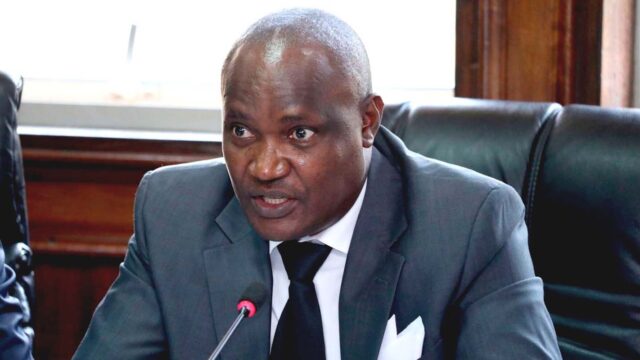Why CS Mbadi thinks payslips have not shrunk too much
In the last couple of days, Mbadi has stressed that Kenyans’ payslips being raided by the government is an exaggeration.

National Treasury and Economic Planning Cabinet Secretary (CS) John Mbadi is on a charm offensive to convince Kenyans that the government is on track to lifting their economic status. In the last couple of days, Mbadi has stressed that Kenyans’ payslips being raided by the government is an exaggeration.
During an interview with NTV Kenya’s Fixing the Nation, the CS stated that the Tax Laws (Amendment) Act of 2024 has helped the government put more money in Kenyans’ pockets since December. “We have improved people’s payslips; it is only that sometimes we overplay this discussion around payslips getting thinner,” he said, speaking of the middle class, which is defined as those who earn between Sh60,000 and Sh150,000.
CS Mbadi added that Kenyans who have failed to look at the economic reforms objectively do not fully appreciate the government’s progress. “Some people say that the perception of whether you have money in the pocket is purely individual… I think some of us have just decided to block their minds that they’re not seeing it.”
The government has been on the receiving end over the introduction of new deductions on payslips in the last two budget cycles. The Affordable Housing Levy, which was introduced in March 2024, deducts an extra 1.5% from an employee’s gross pay. The government then introduced a 2.75% deduction for the Social Health Insurance Fund (SHIF) in October last year. The fear is that more deductions will be introduced this year as well.
But Mbadi’s take is that after the enactment of the Act in December, payslips are not as thin as they were previously. This law made contributions to SHIF, affordable housing, and post-retirement medical fund deductible in determining taxable employment income.
The CS explained that someone earning Sh100,000 now gets deducted Sh1,925 for SHIF instead of Sh2,750. “Before, in NHIF, you were contributing Sh1,700; remove that amount, and you will realise the extra amount that the government is taking from you for SHIF is Sh225,” he said, adding, “Yes, Kenyans are earning less today but not as exaggerated as being reported. We have actually improved people’s payslips.”
Even so, employees still have to pay the housing levy. They will also have to dig deeper into their pockets due to higher National Social Security Fund deductions beginning this month. For example, Tier 1 contributions will be calculated at Sh8,000, up from Sh7,000. This means that contributions will increase to Sh480 from Sh420 for employees, with employers matching the same.
Kenya’s economic challenges began long before the current administration. Before the repayment made in 2024 put Kenya back on track, the country faced the immediate threat of defaulting on its Eurobond debt. The CS maintains that it is only a matter of time before Kenyans begin to appreciate the economic turnaround that the National Treasury is working on. “I am alive to the fact that the trust in the government went down drastically, especially when the Finance Bill, 2024, was brought to parliament and Kenyans felt their concerns were not taken seriously,” he stated.
In efforts to involve the public in economic policymaking, he is seeking its views on taxation and debt management. This is aimed at aligning policies with the needs of the populace, enhancing transparency and accountability. To personally engage Kenyan citizens on what the government has been working on to turn around the economy, the CS headed to Jevanjee Gardens.
On one hand, CS Mbadi acknowledged the ongoing challenges faced by Kenyans, such as the high cost of living and taxation. On the other, he emphasised that the economy is on a positive trajectory, pointing to systematic salary payments to state officers and timely disbursement of funds to counties as signs of stabilisation.
“We are not doing okay but we are better than yesterday. There is this rating from Moody’s; some people think it is hearsay. The credit rating is all about the ability of a country to repay its debts,” he told Bunge La Wananchi.
“Kenya’s economy is rising. We haven’t reached where we should be, but if we remain focused and don’t drop the ball, then certainly, Kenya’s economy will be much better in a short while,” he added. He urged citizens to allow the government more time to implement its economic recovery plans, which include expanding the tax base to boost cash flow.
